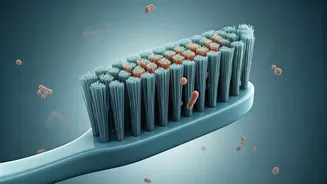The Bacterial Battleground
Your toothbrush, a tool meant for cleanliness, often becomes a breeding ground for a diverse array of bacteria. This occurs due to various factors. Firstly,
the warm, moist environment of a bathroom is ideal for microbial growth. Secondly, toothbrushes are frequently stored in close proximity to other items, increasing the potential for cross-contamination. Third, the bristles themselves provide a perfect surface for bacteria to adhere and thrive. These microorganisms can originate from various sources, including the mouth, the bathroom environment, and even airborne particles. The presence of these bacteria poses significant health risks that necessitate vigilant hygiene practices.
Sources of Contamination
Several sources contribute to the contamination of your toothbrush. During brushing, bacteria, along with food particles and other debris, are easily transferred from your mouth to the bristles. Additionally, the bathroom environment itself harbors bacteria. These can be spread through aerosols from toilet flushing or from touching contaminated surfaces. Toothbrushes stored close to each other in a holder can lead to the exchange of bacteria. Research indicates that toothbrushes often carry a mix of bacteria, including species like Streptococcus, which can contribute to various oral and systemic health issues. Recognizing these potential sources is the initial step towards effective hygiene measures.
Health Implications Explained
The bacteria that accumulate on your toothbrush can pose several health risks. Introducing bacteria back into your mouth can lead to various oral health problems. This can include gum inflammation, bad breath, and an increased risk of infections. The bacteria can also trigger systemic issues if they enter the bloodstream. This is particularly concerning for individuals with weakened immune systems, those with pre-existing conditions, or those who have had recent dental procedures. In these cases, the bacteria on your toothbrush may contribute to infections in other parts of the body. Proper toothbrush hygiene practices become even more critical to safeguard health and overall well-being.
Simple Hygiene Practices
There are straightforward yet impactful steps that you can take to maintain the hygiene of your toothbrush and minimize the risk of bacterial contamination. After each use, thoroughly rinse your toothbrush under running water to remove any visible debris. It is also advisable to store your toothbrush upright in a well-ventilated area to allow the bristles to dry completely, thus reducing bacterial growth. Moreover, avoid sharing toothbrushes with others, even family members. Experts recommend replacing your toothbrush every three months, or sooner if the bristles become frayed or damaged. These simple practices significantly enhance toothbrush hygiene and improve your oral health.
Advanced Protection Methods
Alongside the basic hygiene practices, there are advanced methods to further reduce bacterial contamination. One approach is to soak your toothbrush head in an antibacterial mouthwash or a diluted solution of hydrogen peroxide for a short duration. Although, remember to rinse the toothbrush thoroughly afterwards. Toothbrush sanitizers are available that use UV light to kill bacteria. Always follow the manufacturer's instructions if you choose to use one. These additional methods, when combined with consistent brushing and proper storage, provide a comprehensive strategy for preventing bacterial buildup. Taking these measures guarantees superior oral health and provides peace of mind.
Focus on Prevention
Taking preventative measures is critical for managing the health risks associated with bacteria on your toothbrush. By practicing diligence in your oral hygiene, you can prevent many health problems. Regular dental check-ups, along with proper brushing and flossing, are key components of a complete oral health regimen. Awareness of the potential sources of contamination and the consistent practice of the hygiene tips provided are essential for maintaining your well-being. By taking a proactive approach to toothbrush hygiene, you can actively reduce the risk of oral infections, improve your overall health, and promote a fresher, healthier smile. Your efforts towards preventing bacterial buildup directly contribute to your overall well-being.



















